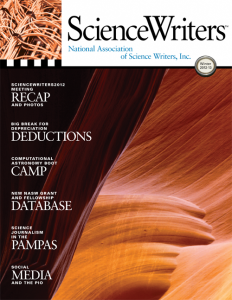By James Cornell
Be forewarned. The Finns have a fixation on forests. Not surprising, perhaps, for a people living in the most forested country in Europe. Finland is nearly 86 percent covered in trees, and the Finns naturally associate all this timber with wealth, warmth, and well being.In short, if you attend the 8th World Conference of Science Journalists (WCSJ2013), in Helsinki in June, be prepared, even if not to hug some trees, at least to go into the woods for some scientific — and social — interactions with your lumber-loving hosts.
Indeed, a sure conference highlight will be “science at midnight,” a seminar on the development of innovative and renewable wood-based materials for the future, held in the heart of a coniferous boreal forest.
Before you feel compelled to pack double-bladed axes and tree-climbing crampons be assured that the forest seminar is optional and offsite. Most of the conference will be held in downtown Helsinki and will deal with the continuing (and considerable) problems of science journalism’s future.
The WCSJ organizers received nearly 200 proposals from journalists in 42 countries on topics ranging from understanding data sourcing to coping with digital media and from publishing e-books to psyching out pseudo experts. The final program (which, at press time, was still a work in progress) has been culled to about 70 sessions — seminars, panels, workshops, and plenary lectures — crammed into four days, June 24 to 28. Luckily, this is also a time of almost 24-hour sunshine, so there is no excuse for sleeping through sessions.
As has been the case at past conferences, U.S. science journalists make a fine showing, with some 40 Americans scheduled to speak. An unusual number of those are NASW members — Deb Blum, Tabitha Powledge, Carl Zimmer, and NASW Executive Director Tinsley Davis, to name just a few.
The final list of speakers and sessions should be online by the time this issue reaches your mailbox. Go to wcsj2013.org and be sure to check out the “Social Programme,” too. It includes another unique arboreal event: an open-air dance night at Lammassaari, an urban wooded isle where one can do the letkajenkka, a Finnish version of the “Bunny Hop” for lumberjacks.
Global change(s)
-
After a decade of supporting the travel of young German science writers to the annual AAAS gathering as well as that of international reporters, including (as Beryl Benderly noted in the fall issue of SW) many U.S. journalists, to the biennial ESOF meetings, the Robert Bosch Foundation will shift focus to train “general-assignment reporters” at German news media on how to cover science and technology issues. The new effort responds to an environment in which traditional media — even in Europe — can no longer afford to support specialty writers, i.e. science reporters, and generalists must cover all topics, from local crime to global warming.
-
Nick Ishmael Perkins, a journalist, media trainer, and project manager who worked in Sub-Saharan Africa, South Asia, and the Caribbean, has succeeded David Dickson as director of SciDev.Net, the online news service providing sci-tech information for and about the developing world. Dickson, the founding director, will continue on as a contributing editor. The service’s 2011 annual report, as well as current news, can be seen at scidev.net.
-
The World Federation of Science Journalists (WFSJ) held a special general assembly in Dublin last July to present member organizations with both a new mission statement, more clearly defining its role and goals, and a new set of bylaws. The latter includes a provision — prompted by quirky Canadian rules concerning the status of “charitable organizations” — requiring that at least two Canadian residents be members of the executive board. Luckily, Canada has two science journalists’ organizations — one national, the other Quebecois — so finding the mandatory two representatives should be easy. Not so easy was the vote in the general assembly, where most measures usually pass unanimously. This time, there was one notable abstention — EUSJA, the European umbrella group representing some 2,000 journalists in 24 countries and not that happy with a Canadian overload on the WFSJ board.
-
WFSJ’s Executive Director Danielle Vinette left the federation shortly after the Dublin meeting, having seen through both the general assembly preparation and its charitable-status application, both unquestionably tough and tiring assignments. Until a new executive director is found, Jean-Marc Fleury will continue to serve in the position he originated.
James Cornell cornelljc@earthlink.net is president of the International Science Writers Association

